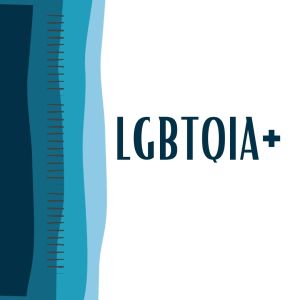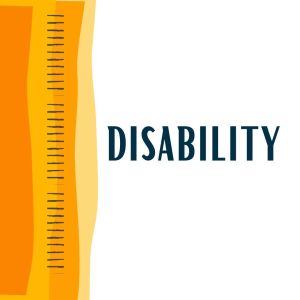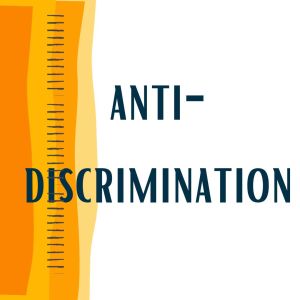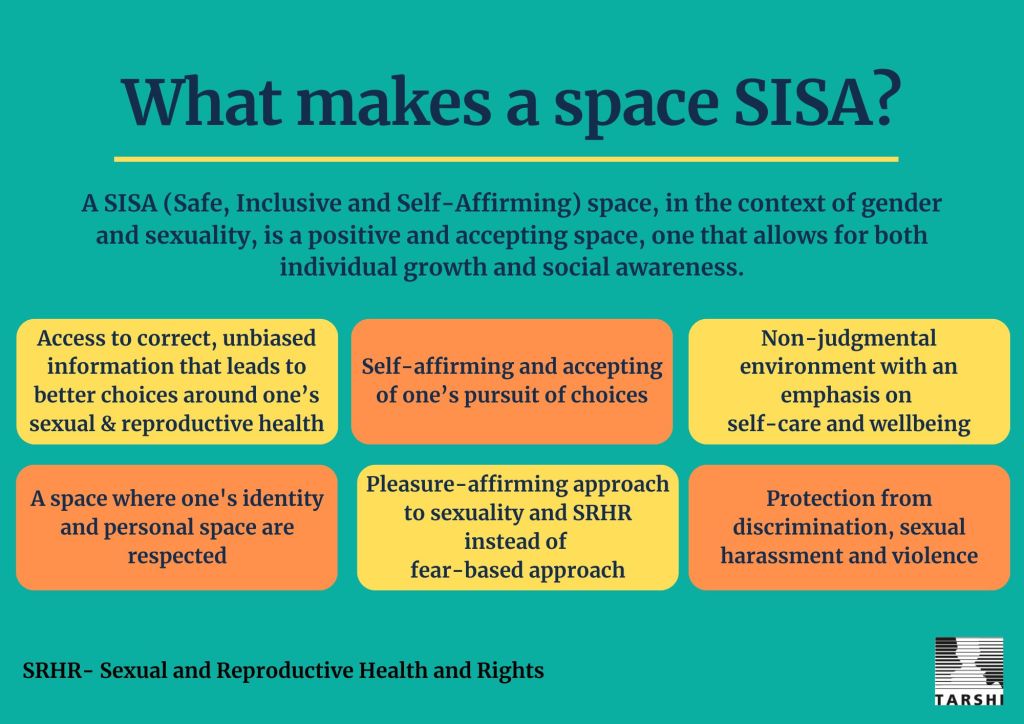SISA report: Equity in Action: Experiences of Non-Profits working towards Safe, Inclusive and Self-Affirming Workplaces.
The longer version of the SISA report shares experiences and outcomes of 15 NGOs ‘ and collectives’ efforts towards Safe, Inclusive, Self-Affirming.
SISA infographic: Equity in Action: Experiences of Non-profits working towards Safe, Inclusive and Self-Affirming Workspaces
The infographic is a shorter version of the SISA report highlighting the summary and key points from our larger research on understanding journey of non-profit workplaces to be Safe, Inclusive and Self-Affirming.
From 2019, TARSHI has focused its work on efforts towards creating Safe, Inclusive, Self-Affirming, or SISA spaces.
What makes non-profit workplaces SISA? Read our report sharing experiences and outcomes of 15 NGOs ‘ and collectives’ efforts towards SISA. You can find the longer version of the report here and a shorter version here.
Watch our webinar: “Inclusion and Intersections at the NGO workplace: Where Are We? along with a detailed summary of the webinar here.
What is a SISA Space?
A SISA space offers an environment that is non-judgmental, rights-based and self-affirming, where people can feel safe and free from fear to talk about, learn about and/or experience their sexuality and wellbeing. The creation of a SISA space requires each of us to integrate a SISA lens into work processes, to disseminate information on SISA, and to advocate for perspectives, policies and practices that align with a SISA approach.




In recent times, there has been increasingly more discussion about sexuality and related issues in the public domain. Some of this has occurred in tandem with hearings of marriage equality in India, #MeToo Movements, the reading down of Section 377 in September 2018, and various other recent progressive Supreme Court judgements. However, there are still many norms and societal and attitudinal barriers that prevent people from being able to comfortably be who they are, and from feeling safe and free enough to experience their sexuality in a way that does not harm themselves or anyone else.
Sexuality is a central aspect in many people’s lives, and is not simply limited to sex itself, or even, one’s sexual orientation – it also includes one’s gender identity and gender roles, one’s pleasure, intimacy, wellbeing, relationships, and so on. But when people talk about sexuality, there is still a tendency to approach it from the lens of sexual violence or discrimination. Negative or fear-based approaches to sexuality can be damaging, because of the lasting impacts they may have both on individuals and on society at large. They may lead to furthering taboos around sexuality and painting certain desires and identities as being ‘wrong’ or ‘immoral’. Hence, it is important to examine the kind of messages we are giving and receiving about sexuality, what we are learning from them, and how that is being reflected in practice.
We receive these messages about sexuality in many different ways. The spaces in which we live, work, study and play are both our learning ground and our practice ground. If the individual spaces we occupy, where we pick up most of our value systems from – for example, home, school, workplaces – are made safe, inclusive and self-affirming, then, as the sum of the parts that make up a whole, it can lead to ever-widening positive social impact. TARSHI has always believed in a pleasure-affirming approach to sexuality and SRHR. By pleasure-affirming approach we mean that sexuality should not only be addressed from a violence or disease prevention angle, but should also be about pleasure and individual choices. The pleasure-affirming perspective is also the main thrust of SISA.

A SISA space is a positive, accepting space, one that allows for both individual growth and social awareness. The spaces we occupy in our daily lives – schools, colleges, workplaces, even public or online spaces – should ideally become SISA spaces.
- It is “safe” from judgement, policing, harassment and violence; it is “inclusive” of diverse identities (be it related to gender, sexuality, mental health, disability, class, caste, and so on) and of diverse experiences (i.e. whether or not one is married, whether one has had multiple sexual partners, and so on).
- it is “affirming” and accepting of one’s pursuit of pleasure and one’s choices. A space where one can enjoy and feel good about their sexuality, rather than having to repress it or view it through a negative lens.
- It is a space where one has the freedom to talk about sexuality-related concerns, as well as the access to correct, unbiased information about these sexuality-related concerns.
- It is a space where one’s identity is respected and personal boundaries (i.e., their privacy, their physical space) are also respected.
- It is a space where the need for self-care – the small or big actions we take in order to take care of ourselves and build resilience in the face of difficult circumstances – is emphasised and respected.
The impact of building even one SISA space will, we hope, cascade into the creation of more such spaces, because the values of SISA are meant to be universal. Even if one space moves closer to becoming SISA, it means the people in that space are closer to having the information, rights, services, and protections they should have in an ideal world. This in turn, can influence the other spaces those very people occupy. For example, if one’s workplace incorporates SISA ideals, one might feel inspired and empowered to try to plant the seeds of those SISA ideals into their family life too, in the process, spreading it to more and more people
TARSHI’s journey towards building rights based and SISA spaces
Our organisational goals from 2019–2025 include furthering the values of SISA. It includes the capacity-building of service providers (like teachers, counsellors, human rights defenders, and so on) so they can understand, endorse and incorporate SISA into their work, the dissemination of information on SISA, as well as advocacy efforts with various organisations to help them align their workplaces to the SISA perspective.
SISA is bigger than just TARSHI’s work: it is about building a better future, where safety, inclusivity and self-affirming practices are normalised in physical spaces as well as the conversations that occur within them. And to achieve that, both as individuals and collectives, we must make a conscious effort to introspect our role in how we can shape or influence the spaces we inhabit, and how we can put the values of SISA into action to affect long-term change.
We are also exploring and documenting some of the ways the pandemic has influenced existing policies/approaches, and given rise to new ways of thinking about inclusion. The research also helped us introduce our understanding of SISA to a range of organisations, and, we hope, built buy-in for their collaboration with us when we eventually get to co-creating the guidelines. In 2021, TARSHI had reached out to more than 40 diverse organisations and collectives spread across the country, working on SRHR, women’s rights, queer and trans* rights, disability rights, domestic violence, gender and technology, mental health, counselling, and youth rights for understanding their efforts on SISA. TARSHI interviewed organisations to understand and present the experiences and outcomes of NGOs’ efforts to be SISA. The interviews were also an opportunity to explore and document some of the ways the pandemic influenced policies/approaches and gave rise to new ways of thinking about inclusion. Read more about the interviews here
Currently, we are in the process of analysing data from the two rounds of interviews along with the responses to the survey questions. In 2023 we will disseminate the results of the SISA research so that it reaches people who engage with our work. We also hope to have online consultations and webinars for knowledge dissemination and towards creating the SISA guidelines.
To know more about SISA, you can read our In Plainspeak issues on why and how spaces expressing sexuality must be looked within the lens of SISA. If you want to understand how your organisation or your collective can build SISA spaces, contact us.

